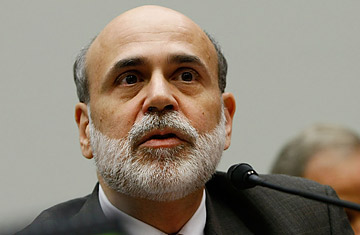
Federal Reserve Chairman Ben Bernanke testifies before the House Financial Services Committee on July 21, 2009
Ever since 1978, when President Jimmy Carter signed the Full Employment and Balanced Growth Act (a.k.a. the Humphrey-Hawkins Act) into law, Federal Reserve chairmen have had to troop before Congress twice a year to explain themselves.
Current Fed chairman Ben Bernanke has had to explain himself on Capitol Hill a lot more often than that. As Bernanke waited to give his semiannual Humphrey-Hawkins testimony before the House Financial Services Committee on the morning of July 21, Alabama Republican Spencer Bachus thanked him for his "willingness to make yourself available on countless numbers of occasions." Since February, the Fed chairman has been called to testify about Bank of America's takeover of Merrill Lynch, the government's bailout of AIG, the federal budget deficit, the Fed's various new lending programs and the economic outlook. He has also taken to penning occasional Op-Ed pieces — today he has one in the Wall Street Journal explaining the Fed's "exit strategy" once it decides it's safe to take the economy off life support.
But this willingness to explain policies and chat with Congress about them hasn't endeared Bernanke and the Fed to all its members. Far from it. After thanking Bernanke in his opening remarks, Bachus — the ranking Republican on the committee — went on to complain that the Fed had taken on too much authority and should restrict itself in the future to setting monetary policy. Texas Republican Ron Paul, whose calls to abolish the Fed have gotten more attention lately than they used to, claimed that "the Federal Reserve, in collaboration with giant banks, has created the greatest financial crisis ever seen."
Not surprisingly, then, Bernanke's testimony went well beyond the usual Humphrey-Hawkins report on how the Fed is doing in meeting its two congressionally mandated goals of maintaining stable prices and full employment (fine on the first, not so fine on the second) to defend the Fed against the rising tide of criticism in Congress.
The actions taken last fall by the Fed, Treasury, Congress and governments around the world "may well have averted the collapse of the global financial system, an event that would have had extremely adverse and protracted consequences for the world economy," Bernanke said. Market improvements were already allowing the Fed to unwind some of the extraordinary actions it took last fall, with credit extended to banks and other financial firms declining from $1.5 trillion at the end of 2008 to less than $600 billion now. Congressional meddling in Federal Reserve decision-making — there are proposals to increase Congress's audit authority over the Fed — could bring a "perceived loss of monetary policy independence" that "could raise fears about further inflation, leading to higher long-term interest rates and reduced economic and financial stability." And so on.
It's hard to tell whether the Fed is in any actual danger from its congressional critics. The Administration's proposals for regulatory reform would, on balance, give more power to the Fed than it has now. And House Financial Services Committee chairman Barney Frank remains a staunch Fed defender. "When you have a terrible mess, it is unlikely that those who attempt to alleviate the danger will come out looking clean," he said in Bernanke's defense this morning. Then again, Frank said, the congressional griping will likely continue until the economy begins to show marked signs of improvement — because, as he put it, "no one has ever gotten re-elected with the bumper sticker that says 'It would have been worse without me.' "
